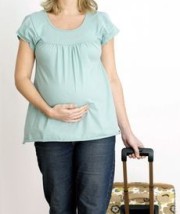 There is absolutely no reason why you cant travel while you are pregnant with a little planning and basic care – unless of course your health care provider has suggested otherwise.
Of course it will be much easier if you are not travelling alone, especially over long distances, so if possible take a friend or partner along the longer trips – to help share the driving load and keep you company along the way.
There is absolutely no reason why you cant travel while you are pregnant with a little planning and basic care – unless of course your health care provider has suggested otherwise.
Of course it will be much easier if you are not travelling alone, especially over long distances, so if possible take a friend or partner along the longer trips – to help share the driving load and keep you company along the way.
Are Pregnant Women More prone to motion sickness?
No – there’s no evidence that being pregnant is going to increase the chances of developing motion sickness while you are travelling. If you are prone to suffer from motion sickness then there are a few tips which you may want to try in order to prevent motion sickness.- Sit in the front seat
- Open the window for fresh air
- Focus on the horizon or a distant object
Seatbelt Safety
When you are travelling you will definitely want to be wearing your seat belt. There may have been some people who may have said that you may harm your baby if you wear a seatbelt while travelling, but this is simply not the case! What is important is that you do wear your seatbelt correctly to avoid harming your baby should anything happen. The lap belt should be secured below your belly, ensuring that it fits snugly on your hipbones. Dont ever wear the seat belt so that it crosses, or goes above your belly! The shoulder strap of your seatbelt should always cross between your breasts. Tray and make sure that the strap doesn’t cut across your neck, and if it does then you can just reposition it so that it is more comfortable! Do not place the shoulder belt under your arm or behind your back.Airbag Safety
The National Highway Traffic Safety Administration (NHTSA) is currently reviewing the effect of air bags on pregnant women. At the moment they are only saying that pregnant women should sit as far back from the air bag as possible.Traveling Comfortably
As we are sure you are aware, it is very difficult to stay comfortable in one position for a long period of time when you are pregnant. If you are travelling long distances, it probably wont take you a long time before you start feeling uncomfortable, start to swell and even start getting leg cramps. So, to make your trip a little easier, we have some suggestions for you. First, prepare yourself a little pregnancy car kit with the following:- Bottled water – you must keep your fluid intake up when you are travelling
- Healthy snacks
- Ear plugs and neck pillow so you can nap
- Slippers or socks you can slip into
- Waterproof bags for motion sickness
- Premoistened towelettes or baby wipes
- Notebook and pen (when you’re the passenger — for jotting down all those things that pop into a pregnant woman’s brain — it’s a great chance to make to-do lists and the like
- Book to read or cross word puzzles
- Good music
What Happen If You Are In An Accident?
If you are involved in a car accident – no matter how small – it is important that you are examined immediately. Even though the uterus does offer support for your baby there are other complications which may arise as a result of an impact. Any jolt could potentially separate the placenta from the uterus called a placental abruption. This can lead to hemorrhage, miscarriage, or premature delivery. It is important that you be checked over, as it is possible to suffer any of these without noticing any immediate symptoms.Pregnancy & Car Travel


